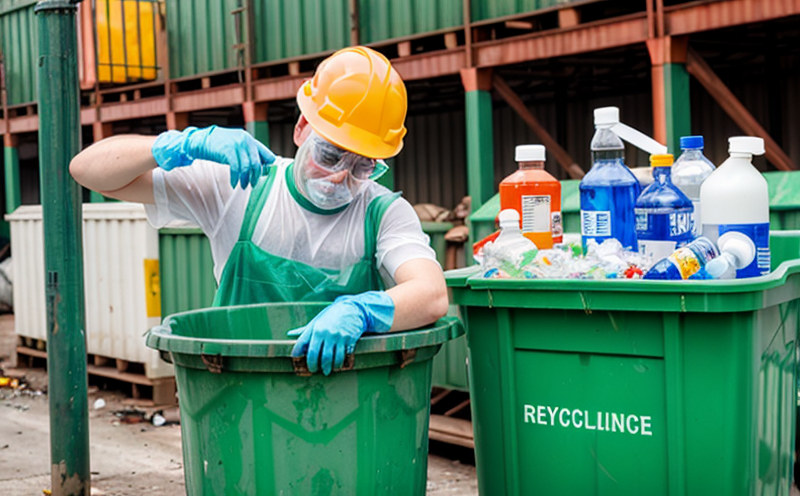EN 14039 Organic Compound Testing in Recycled Waste
The European standard EN 14039 provides a framework for ensuring that recycled waste materials comply with specific organic compound limitations. This service focuses on the rigorous testing and analysis required to meet these standards, particularly relevant for industries dealing with post-consumer plastics, paper, textiles, and other recyclable materials.
The process begins with the receipt of a sample from a client, which is then prepared according to strict protocols outlined in EN 14039. This involves thorough cleaning, drying, and sometimes even chemical digestion steps depending on the material type and suspected contaminants. Once prepared, the samples undergo quantitative analysis using advanced instrumentation such as gas chromatography-mass spectrometry (GC-MS), liquid chromatography-tandem mass spectrometry (LC-MS/MS), and Fourier transform infrared spectroscopy (FTIR).
The test parameters are critical for ensuring accuracy and reliability. For instance, the detection limits for various organic compounds must be stringent to account for trace amounts present in recycled waste streams. Acceptance criteria vary based on the intended use of the material; for example, food contact materials have more stringent limits than general industrial uses.
Instrumentation plays a pivotal role in this testing process. GC-MS is used for its high sensitivity and specificity, allowing us to identify even minute traces of organic compounds. LC-MS/MS offers both qualitative and quantitative capabilities, making it indispensable for complex mixtures found in recycled materials. FTIR provides structural information about the polymers present, aiding in identifying unknown components.
Our laboratory adheres strictly to EN 14039 procedures to ensure compliance with regulatory requirements. This includes maintaining calibration standards, performing method validation studies, and participating in proficiency testing programs recognized by international bodies like ISO and IEC. The results generated are not only accurate but also traceable back to the original sample submission.
The importance of this service cannot be overstated, especially given current environmental regulations aimed at reducing waste sent to landfills. By ensuring that recycled materials meet stringent organic compound limits, businesses can continue their sustainability efforts without compromising product safety or performance. This testing service supports various sectors including packaging manufacturers, paper mills, and textile producers, all of whom rely on compliant recycled materials for cost efficiency and regulatory compliance.
For instance, a major challenge in the recycling industry is managing the presence of dioxins, furans, and other hazardous organic compounds that can leach into the environment. Our tests are designed to detect these harmful substances at levels far below those permitted by law. This ensures that recycled materials do not contribute to environmental pollution or pose risks to human health.
The data generated from these tests is used primarily for two purposes: internal quality control within production facilities and external audits conducted by regulatory bodies. Internal use helps companies maintain consistent product quality across batches, while external audits provide peace of mind knowing that their operations comply with all relevant regulations.
| Industry Sector | Specific Applications |
|---|---|
| Packaging Industry | Ensuring food contact materials meet strict organic compound limits |
| Paper Mills | Verifying recycled fibers do not contain prohibited contaminants |
| Texile Production | Evaluating reclaimed textiles for suitability in new products|
| Plastic Recycling | Detecting hazardous compounds to prevent them from entering the supply chain |
In conclusion, EN 14039 Organic Compound Testing is an essential service for any organization involved in recycling or repurposing waste materials. It ensures that these resources are safe and suitable for reuse, thereby promoting sustainability practices throughout various industries.
Benefits
Compliance with EN 14039 standards offers numerous advantages to businesses operating within the recycling sector:
- Avoids Legal Penalties: Ensures adherence to international and national regulations, thus avoiding potential fines or sanctions.
- Enhances Brand Reputation: Demonstrates a commitment to environmental responsibility which can positively impact customer perceptions.
- Promotes Sustainability: Supports the circular economy by reusing materials efficiently without compromising safety.
- Increases Market Access: Opens up opportunities for exporting products internationally where similar standards are enforced.
Beyond legal and market considerations, this service also fosters innovation within recycling processes. By identifying potential contaminants early in the production cycle, companies can refine their technologies to produce cleaner recycled materials.
Industry Applications
| Industry Sector | Specific Applications |
|---|---|
| Packaging Industry | Ensuring food contact materials meet strict organic compound limits |
| Paper Mills | Verifying recycled fibers do not contain prohibited contaminants |
| Texile Production | Evaluating reclaimed textiles for suitability in new products |
| Plastic Recycling | Detecting hazardous compounds to prevent them from entering the supply chain |
These applications underscore the versatility and necessity of EN 14039 testing across different sectors within the recycling industry.
Competitive Advantage and Market Impact
Adopting EN 14039 Organic Compound Testing can give businesses a significant competitive edge in several ways:
- Differentiation from Competitors: By demonstrating superior quality control, companies set themselves apart as leaders in sustainable practices.
- Better Customer Relations: Meeting stringent standards builds trust with customers who value eco-friendly products.
- Innovation Opportunities: Early detection of potential issues drives continuous improvement efforts leading to better processes and products.
- Predominance in Export Markets: Compliance opens doors to lucrative international markets where similar standards are enforced.
The broader impact extends beyond individual companies; it contributes to the overall health and longevity of the recycling industry itself. Cleaner recycled materials contribute to reduced environmental footprints, supporting global sustainability goals.





